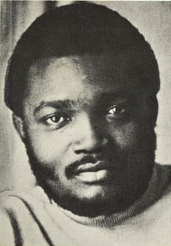Franco Luambo
Franco Luambo | |
|---|---|
 | |
| Background information | |
| Birth name | François Luambo Luanzo Makiadi |
| Also known as | Franco |
| Born | 6 July 1938 Sona Bata, Belgian Congo (modern-day Democratic Republic of the Congo) |
| Died | 12 October 1989 (aged 51) Mont-Godinne, Province of Namur, Belgium |
| Genres | Rumba |
| Occupation(s) | Singer, songwriter, guitarist |
| Instrument(s) | Guitar vocals |
| Years active | 1950s–1980s |
| Labels | Loningisa, Choc |
François Luambo Luanzo Makiadi (6 July 1938 – 12 October 1989) was a major figure in 20th-century Congolese music, and African music in general. He is referred to as Franco Luambo or simply Franco. Known for his mastery of African Rumba, he was nicknamed by fans and critics "Sorcerer of the Guitar" and the "Grand Maître of Zairean Music", as well as Franco de Mi Amor by female acolytes.[1]
Early life
Born 1938 in what was then the Belgian Congo, he played harmonica and other instruments to attract customers to his mother's market stall in Ngiri-Ngiri.[2]
Career
In 1955 Franco formed a band that debuted in the OK Bar. The following year the band was reborn as OK Jazz taking its name from the place it had begun.[3] And then, another change to Tout Puissant O.K. Jazz (T.P.O.K. Jazz) (which stands in French for The Almighty O.K. Jazz)
Franco played in the USA once, in 1983,[4] appearing twice in New York's Manhattan Center.[1]
Musical style
Franco's played guitar playing was unlike that of bluesmen such as Muddy Waters or rock and rollers like Chuck Berry. Instead of raw, single-note lines, Franco built his band's style around crisp open chords, often of only two notes, which "bounced around the beat." Major thirds and sixths and other consonant intervals are said to play the same role in Franco's style that blues notes fill in rock and roll.[5]
Franco's music often relied on huge ensembles, with as many as six vocalists and several guitarists. According to a description, "horns might engage in an upbeat dialogue with the guitar, or set up hypnotic vamps that carried the song forward as on the crest of a wave," while percussion parts are "a cushion supporting the band, rather than a prod to raise the energy level."[5]
Politics
Luambo was a vocal supporter of Zaire's ruler Mobutu Sese Seko, however, they soon became enemies.[1]
Death
He died in 1989 from unknown illness which resulted in four days of national mourning in Zaire.[3]
Selected discography
Luambo's biographer Graeme Ewens has tracked down eighty albums in all.[6]
| Year | Album |
|---|---|
| 1969 | Franco & Orchestre O.K. Jazz* – L'Afrique Danse No. 6 (LP) |
| 1973 | Franco & OK Jazz* – Franco & L'O.K. Jazz |
| 1974 | Franco Et L'Orchestre T.P.O.K. Jazz* – Untitled |
| 1977 | "Franco" Luambo Makiadi* And His O.K. Jazz* – Live Recording of the Afro European Tour Volume 2 (LP, album) |
| 1977 | "Franco" Luambo Makiadi* & His O.K Jazz* – Live Recording of the Afro European Tour |
| 1981 | Soki Odefi Zongisa (LP, album) |
| 1982 | Franco Et Sam Mangwana Avec Le T.P. O.K. Jazz* – Franco Et Sam Mangwana Avec Le T.P.O.K. Jazz (LP) |
| 1983 | Franco & Tabu Ley* – Choc Choc Choc 1983 De Bruxelles A Paris |
| 1986 | Franco & Le T.P.O.K. Jazz – Choc Choc Choc La Vie Des Hommes – Ida – Celio (30 Ans De Carrière – 6 Juin 1956 – 6 Juin 1986) (LP) |
| 1987 | Franco Et Le T.P.O.K. Jazz – L'Animation Non Stop (LP) |
| 1988 | Le Grand Maitre Franco* - Baniel - Nana et le T.P.O.K. Jazz* - Les "On Dit" (LP) |
| 1989 | Franco Et Sam Mangwana – For Ever (LP, Cass) |
See also
References
- ^ a b c Christgau, Robert (3 July 2001). "Franco de Mi Amor". Village Voice. Retrieved 22 May 2019.
- ^ Al Angeloro (March 2005). "World Music Legends: Franco". Global Rhythm. Zenbu Media. Retrieved 14 July 2012.
- ^ a b Nickson, Chris (2006). "Franco: artist biography". All Music. Retrieved 22 May 2019.
- ^ Giola, Ted. "The James Brown of Africa (Part One)". Jazz.com. Archived from the original on 25 March 2012. Retrieved 22 May 2019.
- ^ a b Giola, Ted. "The James Brown of Africa (Part Two)". Jazz.com. Archived from the original on 28 September 2012. Retrieved 22 May 2019.
- ^ Ewens, Graeme (4 January 1994). "Discography". Congo Colossus: The Life and Legacy of Franco & OK Jazz. Buku Press. 320 pages. ISBN 978-0952365518.
{{cite book}}: Unknown parameter|nopp=ignored (|no-pp=suggested) (help)
Further reading
- Stewart, Gary (2004). Rumba on the River: A History of the Popular Music of the Two Congos. Verso. ISBN 978-1859843680.
